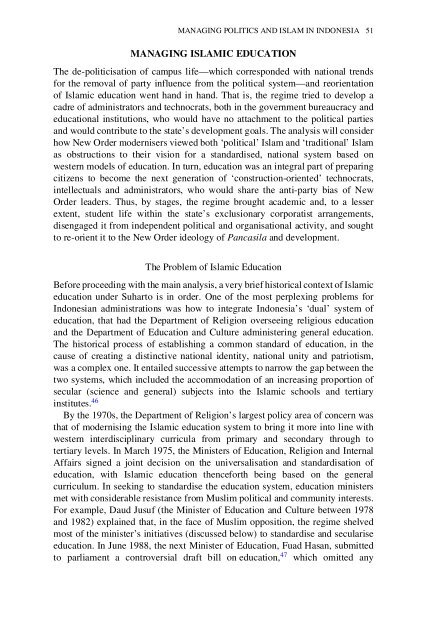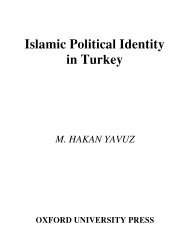You also want an ePaper? Increase the reach of your titles
YUMPU automatically turns print PDFs into web optimized ePapers that Google loves.
MANAGING POLITICS AND ISLAM IN INDONESIA 51MANAGING ISLAMIC EDUCATIONThe de-politicisation of campus life—which corresponded with national trendsfor the removal of party <strong>in</strong>fluence from the political system—<strong>and</strong> reorientationof <strong>Islam</strong>ic education went h<strong>and</strong> <strong>in</strong> h<strong>and</strong>. That is, the regime tried to develop acadre of adm<strong>in</strong>istrators <strong>and</strong> technocrats, both <strong>in</strong> the government bureaucracy <strong>and</strong>educational <strong>in</strong>stitutions, who would have no attachment to the political parties<strong>and</strong> would contribute to the state’s development goals. The analysis will considerhow New Order modernisers viewed both ‘political’ <strong>Islam</strong> <strong>and</strong> ‘traditional’ <strong>Islam</strong>as obstructions to their vision for a st<strong>and</strong>ardised, national system based onwestern models of education. In turn, education was an <strong>in</strong>tegral part of prepar<strong>in</strong>gcitizens to become the next generation of ‘construction-oriented’ technocrats,<strong>in</strong>tellectuals <strong>and</strong> adm<strong>in</strong>istrators, who would share the anti-party bias of NewOrder leaders. Thus, by stages, the regime brought academic <strong>and</strong>, to a lesserextent, student life with<strong>in</strong> the state’s exclusionary corporatist arrangements,disengaged it from <strong>in</strong>dependent political <strong>and</strong> organisational activity, <strong>and</strong> soughtto re-orient it to the New Order ideology of Pancasila <strong>and</strong> development.The Problem of <strong>Islam</strong>ic EducationBefore proceed<strong>in</strong>g with the ma<strong>in</strong> analysis, a very brief historical context of <strong>Islam</strong>iceducation under Suharto is <strong>in</strong> order. One of the most perplex<strong>in</strong>g problems for<strong>Indonesia</strong>n adm<strong>in</strong>istrations was how to <strong>in</strong>tegrate <strong>Indonesia</strong>’s ‘dual’ system ofeducation, that had the Department of Religion oversee<strong>in</strong>g religious education<strong>and</strong> the Department of Education <strong>and</strong> Culture adm<strong>in</strong>ister<strong>in</strong>g general education.The historical process of establish<strong>in</strong>g a common st<strong>and</strong>ard of education, <strong>in</strong> thecause of creat<strong>in</strong>g a dist<strong>in</strong>ctive national identity, national unity <strong>and</strong> patriotism,was a complex one. It entailed successive attempts to narrow the gap between thetwo systems, which <strong>in</strong>cluded the accommodation of an <strong>in</strong>creas<strong>in</strong>g proportion ofsecular (science <strong>and</strong> general) subjects <strong>in</strong>to the <strong>Islam</strong>ic schools <strong>and</strong> tertiary<strong>in</strong>stitutes. 46By the 1970s, the Department of Religion’s largest policy area of concern wasthat of modernis<strong>in</strong>g the <strong>Islam</strong>ic education system to br<strong>in</strong>g it more <strong>in</strong>to l<strong>in</strong>e withwestern <strong>in</strong>terdiscipl<strong>in</strong>ary curricula from primary <strong>and</strong> secondary through totertiary levels. In March 1975, the M<strong>in</strong>isters of Education, Religion <strong>and</strong> InternalAffairs signed a jo<strong>in</strong>t decision on the universalisation <strong>and</strong> st<strong>and</strong>ardisation ofeducation, with <strong>Islam</strong>ic education thenceforth be<strong>in</strong>g based on the generalcurriculum. In seek<strong>in</strong>g to st<strong>and</strong>ardise the education system, education m<strong>in</strong>istersmet with considerable resistance from Muslim political <strong>and</strong> community <strong>in</strong>terests.For example, Daud Jusuf (the M<strong>in</strong>ister of Education <strong>and</strong> Culture between 1978<strong>and</strong> 1982) expla<strong>in</strong>ed that, <strong>in</strong> the face of Muslim opposition, the regime shelvedmost of the m<strong>in</strong>ister’s <strong>in</strong>itiatives (discussed below) to st<strong>and</strong>ardise <strong>and</strong> seculariseeducation. In June 1988, the next M<strong>in</strong>ister of Education, Fuad Hasan, submittedto parliament a controversial draft bill on education, 47 which omitted any




